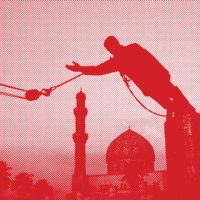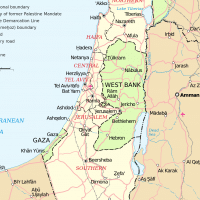-
Bolshevism, Balfour and Zionism: A tale of two centenaries
November 2017 marked the centenary of two of the most decisive events in the twentieth century: the Bolshevik-led revolution in Russia and the Balfour Declaration in Britain.… At loggerheads were two mutually exclusive political objectives: the one to promote worldwide, anti-imperialist revolution; the other, to further British imperial interests in the Middle East.
-
GROKO or NO GROKO?
It happened in Bonn last Sunday, on January 21st. There were close to 650 delegates, the gallery in the congress hall was also packed with observers. The suspense was almost visible, also among the demonstrators outside. All over Germany millions were watching closely to see if the future path of the Social Democratic Party (SPD), […]
-
The struggle for actually building socialist society
“The economic base built in Mao’s era laid the foundation for a sovereign capitalist development.”
-
After alienation
Since the collapse of the Berlin wall and the Soviet Union, many on the left seem to have swallowed the idea that there is no alternative to capitalism.
-
‘Socialism a necessity for human survival’
According to John Bellamy Foster, the world environmental crisis is a systemic crisis, a product of capitalism, and requires systemic changes in the capitalist system. He says that environmental sustainability is incompatible with capitalism.
-
On the contribution of István Mészáros (1930-2017) to critical thinking
István Mészáros, an outstanding Hungarian Marxist philosopher, died on October 1st 2017 in London. Born in Budapest in 1930 into a working-class family, brought up by his mother, he began working in industry at the age of twelve. He actually lied about his age, claiming to be sixteen, in order to be accepted by the factory.
-
Humans, “aliens,” and “shithole countries”
There is no evidence that Donald Trump has ever in his life performed a single selfless act, let alone any act of heroism. Probably he wouldn’t be able even to imagine the nobility of character I witnessed among Port-au-Prince residents after the earthquake, and among “alien” activists like Ravi and Jean here in New York.
-
The total Marx and the total theory of literature
Revolutionary reflections is proud to publish a lost gem of Marxist aesthetic theory by Ian Birchall. Originally the piece was given as a paper at a conference on the Grundrisse and the “total Marx” on 5 June 1971 (the day after the death of Marxist theoretician Georg Lukács). It was published in Situating Marx: Evaluations […]
-
Illusions of world-ecology
Every airport bookstore features books with titles like 10 Ways to Retire Rich, 150 Places You Must Visit Before You Die, or 8 Easy Steps to a Flatter Tummy, with the numbers in very large type on their covers. They are the publishing equivalent of junk food, quickie books written to match titles that were invented by the marketing department to generate impulse purchases. The authors and publisher of A History of the World in Seven Cheap Things must have had such books in mind when they chose its title and designed its cover.
-
Trump, the Nationalist-Populist Movement, and Wolff’s Fire and Fury
The real story of Wolff’s Fire and Fury—ignored by an establishment media that has no interest in revealing anything about the class struggle—is the rise of the nationalist-populist movement, which has used Trump effectively to grow its base.
-
“The seeds of revolt are present in many places”
Interview with John Bellamy Foster, Editor of Monthly Review. By JIPSON JOHN and JITHEESH P.M.
-
Marx on imperialism
On February 19, 1881, Karl Marx had written a remarkable letter to N.F. Danielson, the renowned Narodnik economist who had also gone under the name of Nikolayon and whose work had been much discussed by Lenin.
-
Capitalism, exterminism and the long ecological revolution
teleSUR spoke to Monthly Review editor John Bellamy Foster about climate change & the need to fight for an ecosocialist, revolutionary alternative to the profit-driven world capitalist system.
-
No Berlin Bulletin—just birds and hopes
The fights which must be fought and difficulties endured may perhaps be a mite easier and lighter if accompanied by occasional deep breaths of nature with its simple joys, and the freedom hopes, the values and solidarity I sometimes found there and enjoyed so greatly, may also contribute just a little to efforts of good people everywhere in our good cause.
-
The Odious Iraqi Debt
This article, originally written towards the end of 2003, is now published on our website for the first time in English. The odious Iraqi debt is still under-documented today, though it is highly relevant in our research and our proposals against all illegitimate, illegal, odious and unsustainable debts. It is a rare case where a […]
-
Naming Capitals
For the republican Arab world, the past twelve years have been defined by foreign invasion, civil and proxy wars, revolution and counter-revolution. It has been devastating. However, it should be remembered that, within the republican Arab world, the twenty-first century began with the American backed crushing of the second Palestinian uprising (intifada).
-
Crisis in Germany?
The impasse in forming a government in Germany has dragged on since election day, September 24th—often like a traffic gridlock, hardly moving forward. But Germany is Europe’s main central power—and with no proper government!
-
Eroding the consensus: imperialism, democracy, Zionism & the Labour Party
Science for the People is in the process of relaunching as a publication in the United States. The original magazine archives can be viewed here. Click here to sign the petition to investigate Moshé Machover’s expulsion from the Labour Party. Science for the People (SP): Thank you for speaking with us. As the details of […]
-
Capitalism unhinged: crisis of legitimacy in the United States
This is expanded and updated from an article first published in German in Das Argument: Zeitschrift für Philosophie und Sozialwissenschaften, no. 323 (2017/3); republished with the kind permission of its editors; originally presented in a panel “The Crisis of the Political,” Institut für kritische Theorie, Berlin, June 9, 2017. For their comments and suggestions, I […]
-
150 Years of Capital—with No End in Sight
For Capital’s explosive force to truly unfold, not only was education in general necessary, but also knowledge of the relevant economic and philosophical theories, in order to perceive not just the explicit, but also the implicit critiques.



















